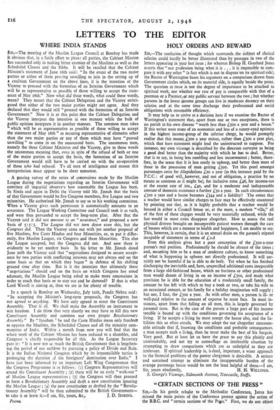HOLY ORDERS AND REWARD
Snt' —The confusion of thought which surrounds_the subject of clerical salaries could hardly be better illustrated than by passag,es in two of the letters appearing in your last issue ; for whereas Bishop H. Gresford Jones asserts that " our profession being what it is . . . it is impossible to com- pare it with any other " (a fact which is not in dispute= its spiritual side), the Rector of Warrington bases his argument on a comparison drawn from Government circles vfhich, on its material side, is equally beside the point. The question at issue is not the degree of importance to be attached to spiritual work, nor whether our rate of pay is comparable with that of a postman or a Premier,fin any public servant between the two ; but whether parsons in the lower ipeome groups can live in moderate decency on their salaries and at the same time discharge their professional and social obligations with reasonable efficiency. It may help us to arrive at a decision here if we examine the Rector of Warrington's statement that, apart from one or two exceptions, there is no parish in his own diocese " worth less than £500 a year and a house." If this writer were mate of an economist and less of a sunny-eyed optimist in the highest income-group of the inferior clergy, he would promptly realise that this means,£5oo a year minus, rather than £500 a year plus, which that bare statement might lead the uninstructed to suppose. For instance, my own vicarage is described by the diocesan surveyor as being a good deal better than the majority with which he has to deal. Better, that is to say, in being less rambling and less inconvenient ; better, there- fore, in the sense that it is less costly in upkeep, and better than most of those in the possession of men getting £5oo. Yet this pearl amongst parsonages costs for dilapidations £20 a year (in this instance paid by the P.C.C.: of -good will, however, and not of obligation, a practice by no means as common as it might be), for inclusive rates £46, for income-tax at the recent rate of los., £40, and for a moderate and indispensable amount of domestic assistance a further £5o a year. In such circumstances £50o a year and a house becomes £344 and a liability! The retort that a teacher would have similar charges to face may be effectively countered by pointing out that, as it is highly probable that a teacher would be housed in either a Council house or, at the most, a modern "villa," all of the first of these chw-ges would be very materially reduced, while the last would in most cases disappear altogether. How to assess the real physical distress brought on innumerable patient women through the care of houses which are a menace to health and happiness, I am unable to say. This, however, is certain, that it is an annual drain on the parson's stipend incapable of statement in terms of £.s.d
Even this analysis gives but a poor conception of the £5oo-a-year parson's real position. Professionally he should be abreast of the times ; and, assuming him to be a man of moderate culture, to know something of what is happening in spheres not directly professional. It will cer- tainly not be harmful if he is able to do both. Yet when he has finished discharging the inevitable and, here, unspecified additional costs inseparable from a large old-fashioned house, which no business or other professional man would dream of living in on an income of £5do, and made what provision he is able for the education of a moderately small family, the amount he has left with which to buy a book or two, or take his wife to an occasional concert, or his family for a holiday imagination will supply ; but not, I fear, the £5oo a year. As with other men, a parson is ill- or well-paid relative to the amount of expense he must face. In mosi in- stances, apart from that falling on all men, this is largely governed by personal taste. But in the case of the parson a large part of his income trouble is bound up with the conditions governing his acceptance of a living. If he accepts a living he must accept the house also, and the lia- bilities this so often entails. We may adopt the not altogether unreason- able attitude that if, knowing the conditions and probable consequences, a man accepts such a living, then he must make the best of his bargain. Very good. But at least let us have the grace to say this plainly and unmistakably, and not try to camouflage an intolerable situation by attempting to draw comparisons which are as unhelpful as they are irrelevant. If spiritual leadership is, indeed, important, a wiser approach to the financial problems of the poorer clergymen is desirable. A serious and sustained attempt to eliminate the insupportable burden of the average parsonage house would be not the least helpful of these.—I am,


























 Previous page
Previous page